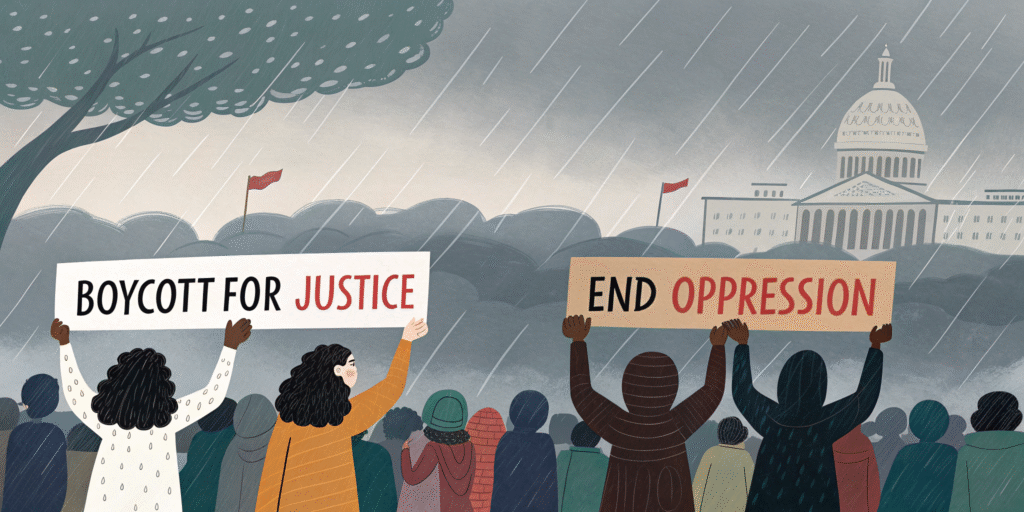Aug 2025(gazakillers)

In times of global injustice, boycotts have proven to be one of the most powerful tools in the hands of ordinary people. They can shift public opinion, pressure governments, and force corporations to change their behavior. When human rights are violated, when illegal occupations persist, and when communities suffer under oppressive systems, the call to boycott becomes more than an act of protest — it is a moral responsibility.
The Power of Boycott: A Proven History
Boycotts are not new. They have shaped history and toppled systems of injustice:
- The Montgomery Bus Boycott (1955–1956) — Sparked by Rosa Parks’ arrest, this boycott ended racial segregation on public buses in Montgomery, Alabama, and became a cornerstone of the U.S. civil rights movement.
- The Anti-Apartheid Boycott (1980s) — Economic and cultural boycotts against South Africa were pivotal in ending the apartheid regime.
- Palestinian-led BDS Movement (2005–present) — The Boycott, Divestment, Sanctions campaign urges people and institutions to withdraw support from companies and entities complicit in Israel’s violations of Palestinian rights.
Each of these movements shows that economic pressure works — when people refuse to fund oppression, the system is forced to change.
Why Boycotts Matter Today
In the age of globalization, money travels faster than ever. Every purchase, click, or investment can either strengthen an oppressive system or help dismantle it. Here’s why boycotts are so effective:
- Economic Pressure on Wrongdoers
When corporations lose revenue due to boycotts, they are forced to reconsider unethical practices. Public relations crises can also damage their market value. - Awareness and Education
Boycotts draw media attention and public debate, forcing previously hidden injustices into the spotlight. - Collective Moral Stand
Choosing not to support products, events, or governments involved in injustice sends a clear message: People will not tolerate complicity in oppression. - Empowering Individuals
Many feel powerless in the face of global issues. Boycotting offers a tangible, peaceful way to contribute to change from anywhere in the world.
What You Can Do — Practical Steps to Join the Boycott Movement
- Research Before You Buy
Identify companies and brands connected to human rights violations.- For the Palestine cause, check lists from BDS Movement and Corporate Watch.
- For environmental justice, see resources from Ethical Consumer.
- Switch to Ethical Alternatives
Support local businesses, fair-trade brands, and ethical companies that align with your values. - Spread the Word
Use social media to share boycott campaigns, petitions, and alternative options. - Engage Your Community
Organize informational events, workshops, or online webinars to raise awareness about ongoing injustices. - Pressure Institutions
Urge your university, workplace, or city council to cut ties with unethical companies or foreign governments complicit in rights abuses.
Boycott as a Global Responsibility
Injustice thrives when people remain silent. Boycotting is not about punishing ordinary workers or small businesses — it is about targeting institutions and systems that profit from oppression. Whether the cause is ending war crimes, resisting apartheid, or combating climate destruction, a boycott is a direct way to say: “Not in my name.”
As consumers and citizens, we have the power to choose where our money, time, and attention go. A single boycott may not change the world overnight, but sustained and collective action can — and history proves it.
Resources:
- BDS Movement Official Site
- Ethical Consumer – Boycotts
- Corporate Watch Investigations
- Amnesty International – Consumer Action
Keywords: boycott movement, why boycott matters, how to boycott, ethical consumerism, BDS, human rights boycott, economic activism, global justice, peaceful protest, divestment campaigns.
